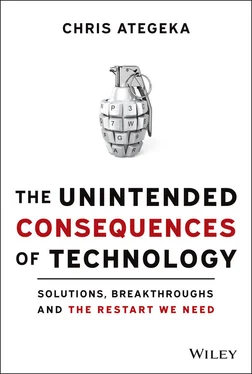Myspace and Kodak both failed to adapt to the technological changes of their time and were replaced by superior products. We as a human species need to adapt or else we will soon be a Myspace.
We can create better systems if we have the will. For example, Walmart saved a billion dollars in fuel costs by increasing the efficiency of their trucking fleet. Elon Musk revolutionized the automotive industry by focusing on clean driving solutions. It can be done! We have seen some movement in the industry by top influential CEOs.
Salesforce billionaire Marc Benioff says, “Capitalism as we know it is dead. The current system has led to profound inequality. To fix it, we need businesses and executives to value purpose alongside profit” (Benioff, 2019).
Stakeholder purpose is becoming as important as shareholder value for many businesses. Inclusion and diversity are hot topics and recognized as levers that drive value both monetarily and in building a stronger, more sustainable future. If we are to have any humanity left on the planet, we must build a better economic system than we have today. Sustainable capitalism can only be achieved through balance and harmony among the individual, social, planet, and ethical dimensions of reality.
In 2020, Walmart CEO Doug McMillon said, “It's time to reinvent capitalism post-Coronavirus. Big problems don't rest on the shoulders of government or corporations alone. I think the growing interest in stakeholder capitalism stems from companies genuinely invested in doing good for our world, because it's the right thing to do and because businesses who take this approach are stronger” (Eben, 2020).
Ray Dalio, founder of Bridgewater, the world's biggest hedge fund, and a man worth about $20 billion according to Forbes , became the latest in a bank of billionaires to go public about his fears of widening income inequality (Dalio, 2021).
Business and technology leaders need to embrace a broader vision of their responsibilities by looking beyond shareholder return and measuring their stakeholder return. This requires that they focus not only on their shareholders but also on all of their stakeholders —their employees, customers, communities, and the planet.
Capitalism in modern America is antithetical to the American Dream.
At first it sounds all fine and dandy, to each their own, whatever you can build for yourself you can have! But the American Dream is about starting with nothing. And it turns out that starting with nothing in a system that doesn't have adequate social programs is like being shackled.
You have a much lower chance of success than if you were to start off in a country with great social systems or with a Inheritance and your dad's garage to set up a desk and start your next big thing. I believe that in America you have less of a chance of achieving the American Dream than in the more socialist/capitalist hybrid countries mentioned earlier in this chapter. A country that practices a mix of capitalism and socialism gives its citizens the freedom to do what they want, and the incentives to do so, but also ensures that everyone has a decent shot at making it big.
Promoting individual happiness as our utmost ethos is self-defeating, as deeply divided societies turn unstable and unhappy. We need a new American Dream based on connection, equality, and sustainable growth. The cost of sharing opportunity and wealth may appear high for today's elites, but the alternative is far worse.
So, as a business leader, if you are to design capitalism better, what do you need? Well, instead of a rather narrow unicorn mindset of building privately held startup companies valued at over $1 billion, we need to adopt a wider “zebra” mindset that thinks about all the stripes of humanity and our planet. This means we consider regenerative growth and think about the 3P win-win-win approach (profit, people, and the planet). Zebra companies put humanity and the planet at the center of their missions.
The future of capitalism is human. Learning from history and reflecting on the legacy we will leave behind are keys to successful and responsible, conscious capitalism.
1 Ali, Waqas. (2016). “Top 5 Causes of the Great Depression – Economic Domino Effect.” https://www.warhistoryonline.com/history/top-5-causes-great-depression-economic-domino-effect.html
2 Amadeo, Kimberly. (2020). “Boom and Bust Cycle, Causes, History, and How to Protect Yourself.” https://www.thebalance.com/boom-and-bust-cycle-causes-and-history-3305803
3 As You Sow. (2021).“The 100 Most Overpaid CEOs” 2021 report. https://www.asyousow.org/reports/the-100-most-overpaid-ceos-2021
4 Beer, Tommy. (2020). “Top 1% Of U.S. Households Hold 15 Times More Wealth Than Bottom 50% Combined.” https://www.forbes.com/sites/tommybeer/2020/10/08/top-1-of-us-households-hold-15-times-more-wealth-than-bottom-50-combined/?sh=6658f1a45179
5 Benioff, Marc. (2019). “Capitalism Is Dead.” https://www.cnn.com/videos/business/2019/10/17/marc-benioff-capitalism-orig.cnn-business
6 Brookings Institution (2021). “The COVID-19 Hazard Continues, But the Hazard Pay Does Not: Why America's Essential Workers Need a Raise.” https://www.brookings.edu/research/the-covid-19-hazard-continues-but-the-hazard-pay-does-not-why-americas-frontline-workers-need-a-raise/
7 Dalio, Ray. (2021). https://www.forbes.com/profile/ray-dalio/#58aceb17663a
8 Dzhanova, Yelena. (2021). “Jeff Bezos and Elon Musk Increased Their Wealth by $217 Billion in 2020.” https://www.businessinsider.com/jeff-bezos-elon-musk-increased-wealth-by-217-billion-2021-1
9 Eben, Shapiro. (2020). ‘It's the Right Thing to Do.' Walmart CEO Doug McMillon Says It's Time to Reinvent Capitalism Post-Coronavirus.” https://time.com/collection/great-reset/5900765/walmart-ceo-reinventing-capitalism/
10 History.com Editors. (2020). “The 1950s.” www.history.com/topics/cold-war/1950s
11 Greene, Jay. (2021). “Amazon's anti-union blitz stalks Alabama warehouse workers everywhere, even the bathroom.” https://www.washingtonpost.com/technology/2021/02/02/amazon-union-warehouse-workers/
12 Henderson, Rebecca M. (2020). “Reimagining Capitalism in the Shadow of the Pandemic.” https://hbr.org/2020/07/reimagining-capitalism-in-the-shadow-of-the-pandemic.
13 Ingraham, Christopher. (2017). “The richest 1 percent now owns more of the country’s wealth than at any time in the past 50 years.” https://www.washingtonpost.com/news/wonk/wp/2017/12/06/the-richest-1-percent-now-owns-more-of-the-countrys-wealth-than-at-any-time-in-the-past-50-years/
14 Pendleton, Devon. (2020). “Stock Surge Produces Record 5 Tycoons With $100 Billion Fortunes.” https://www.bloomberg.com/news/articles/2020-11-09/there-are-now-a-record-five-centibillionaires-after-stock-surge
15 Pettinger, Tejvan. (2019). “Pros and cons of capitalism” https://www.economicshelp.org/blog/5002/economics/pros-and-cons-of-capitalism/
16 Reich, Robert. (2020). “If this doesn't convince you our economy is rigged, I don't know what will.” https://twitter.com/rbreich/status/1329521026158403584
17 Rodrigue, Jean-Paul. (2013). “The Geography of Transportation Systems.” https://transportgeography.org/wp-content/uploads/GTS_Third_Edition.pdf
18 World Happiness Report. (2020). “World Happiness Report 2020.” https://www.worldhappiness.report/
19 Zarroli, Jim. (2020.) NPR.org. “There's Rich, and Then There's Jeff Bezos Rich: Meet the World's Centibillionaires.” https://www.npr.org/2020/12/10/944620768/theres-rich-and-theres-jeff-bezos-rich-meet-the-members-of-the-100-billion-club?utm:source=facebook.com&utm:term=nprnews&utm:campaign=npr&utm:medium=social&fbclid=IwAR1ggHzU3b2ewAHPJYNN6p2w0SdLvUDX1Sl1n8iOJnqTFmWcjwSRSVFM3IY
Читать дальше












